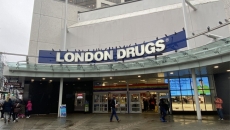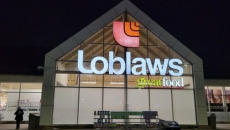Defence Minister Bill Blair is defending Canada's spending promise at the NATO leaders' summit in Washington, D.C., as critics throw cold water on the government's new pledge to meet the two per cent target by 2032.
"That number didn’t sort of just come out of the air," Blair said Friday after returning to Toronto. "It came out of a lot of hard work."
Today’s announcement reflects the statements that the Prime Minister and I have made over the past year: Canada must do more on defence – and we will.
— Bill Blair (@BillBlair) July 12, 2024
The coming decades will be more competitive and challenging than those that came before – and our country must be prepared. https://t.co/TT9urGpDM9
Prime Minister Justin Trudeau announced Canada's new timeline Thursday, just hours before the end of the three-day summit and following days of pressure from NATO countries.
Canada helped found @NATO 75 years ago — and it has created peace and prosperity ever since.
— Justin Trudeau (@JustinTrudeau) July 12, 2024
This Summit, we deepened Canada's role in the Alliance with new actions to strengthen our defence, support Ukraine, and protect Arctic sovereignty. More here: https://t.co/rrQV5NfzRx pic.twitter.com/ecHKyHslfa
Members of the alliance have agreed to spend at least the equivalent of two per cent of national gross domestic product on defence. Canada was the only participant that arrived at the summit without a plan to reach the target.
While Trudeau's commitment came with no details, Blair said Friday it amounts to about $60 billion a year starting in 2032, based on projections that Canada's GDP will be a little bit north of $3 trillion that year.
Blair said the estimated projection came from NATO. It uses models from Organisation for Economic Co-operation and Development, of which Canada is also a member.
"It was important to be realistic about how long it was going to take to make these investments, to do it the right way," Blair said.
"We … thought the best and most verifiable date that we could provide to our allies was by 2032."
The announcement brought some assurances, with NATO Secretary-General Jens Stoltenberg noting in a news conference Thursday that it meant all allies now had a timeline.
British High Commissioner to Canada Susannah Goshko and U.S. Ambassador to Canada David Cohen both posted praise for the pledge on social media.
But there was also concern the promise could violate at least one of the federal government's fiscal anchors.
Randall Bartlett, a senior director of Canadian economics with Desjardins, posted an analysis online that showed the plan could put at risk Ottawa's need to maintain a declining deficit-to-GDP ratio for 2024-25, and to keep deficits below one per cent in 2026-27 and into the future.
He noted the federal government "can raise revenues or reduce spending elsewhere to pay for the increased outlays on defence without increasing the size of the deficit."
Conservative Leader Pierre Poilievre criticized Trudeau's performance at the summit, saying the prime minister was "treated like a human piñata by the rest of the NATO countries."
But as for the apparent reason Trudeau got that treatment, the Conservative leader said he would not commit to the alliance's spending goal.
He said that's because he doesn't make promises he cannot keep.
"Every time I make a financial commitment, I am going to make sure I have pulled out my calculator and done all the math," Poilievre said at a press conference in Montreal on Friday.
"Because people are sick and tired of politicians just announcing that they are going to spend money without figuring out how they are going to pay for it."
Blair didn't provide details or figures on how Ottawa will meet or pay for its promise, but pointed to 10 capabilities Canada wants to acquire that were in April's updated defence policy.
They include shoring up ground-based air defence, modernizing artillery capabilities and acquiring a suite of surveillance and strike drones.
The biggest-ticket item, by far, is the renewal and expansion of the Canadian submarine fleet.
Trudeau and Blair announced this week that Canada is beginning the procurement process to buy up to 12 conventionally powered submarines that can operate under ice.
Blair would not say Friday what that could cost.
The lack of details attached to the new timeline brought skepticism among some business leaders and stakeholders over whether it's realistic to expect the spending boost.
The Business Council of Canada's CEO Goldy Hyder said the target year alone doesn't "clarify how any new defence investments will be fiscally sustainable." He added it is unlikely to quell concerns from international leaders.
Matthew Holmes, with the Canadian Chamber of Commerce, called the announcement "underwhelming at best."
In response to the criticism, Blair said the increased defence spending means the government has an opportunity to build better relationships with Canadian industry and workers.
“It's not just a matter of spending money as quickly as possible," he said. "It's about investing.”






